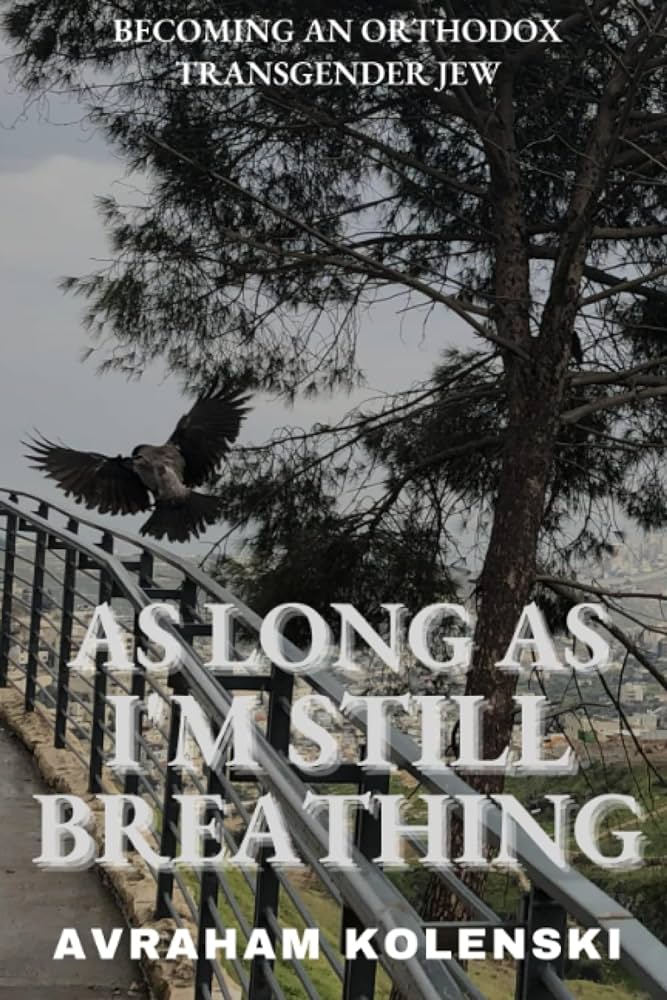Rating: 3/5, average
Trigger warning: depression
The author posted a link to this book in a Jewish Goth Facebook group I’m in, and the topic of being Orthodox Jewish and a transgender man interested me so much I bought the book right away and started reading it as soon as it came in.
As Long as I’m Still Breathing is a 75-page memoir broken up into seven chapters of first-person past-tense prose and free verse poetry. It delves into Avraham’s struggles with depression and how transitioning to male and converting to Judaism helped give him the strength to stay alive. It tells the story of how he converted to Judaism and his experiences with different Jewish communities.
I really appreciated reading about Avraham’s experience because I don’t know of any other books about trans men who are Jewish.
It was a little hard to piece together the timeline of Avraham’s four conversions. The Reform conversion before moving to Israel was a little bit confusing because it was only mentioned in retrospect. It seems to go:
- Initial conversion at Orthodox synagogue #1
- Conversion at Orthodox synagogue #2 because the first one wasn’t considered halachic (not sure why)
- Reform conversion when immigrating to Israel (because he said it’s easier for Reform Jews to immigrate)
- Conversion on entering yeshiva #3
Avraham started his conversion as a nonbinary person with a Reform rabbi. He tried to go back in the closet and be an Orthodox woman, but it was too painful and he felt drawn to Orthodox Jewish theology and practice so he finished his first conversion with an Orthodox rabbi as a trans man.
He experienced transphobia in his first Orthodox community, so he moved to a more progressive Orthodox community and completed a second conversion. The second Orthodox community wasn’t transphobic, but it didn’t support Avraham when a former friend started harassing him. That experience made him feel alone, but he seems to feel positive about that community overall and it’s the one he returns to at the end of the book.
He wanted to study Judaism in greater depth, so he started applying to Orthodox yeshivas (religious schools) in Israel. He was living as a man, so first he applied without disclosing that he was trans. He got accepted to a yeshiva but the acceptance was rescinded once the rabbis found out he was trans.
He applied to a second yeshiva with the recommendation of a rabbi. After he was there for two weeks, the rabbis received an anonymous email outing Avraham as trans. The rabbis had a meeting with Avraham where they asked questions that implied they didn’t know about him being trans. After that meeting he decided to leave the yeshiva.
After leaving the second yeshiva, he came out publicly in a news article on Tablet. In that article, he says he told one of the yeshiva’s rabbis before he came and hoped that rabbi would help get the other rabbis on board, but I guess that didn’t work out.
Then he studied at a third yeshiva in Israel that was designed for people who couldn’t do the usual long yeshiva hours. He got sexually harassed at shabbat dinner and there was still ambient transphobia there. That yeshiva wasn’t without its problems, but he was able to spend six months studying there and only had to leave because living in Israel without citizenship was becoming too expensive.
He returned to a different community in the U.S., and then moved back to the progressive Orthodox community where he lived before he went to Israel.
As Long as I’m Still Breathing was interesting for me to read as a nonbinary Reform Jew. I was born into the faith so I often take Judaism for granted. It’s really cool to read converts’ perspectives on Judaism because converts choose Judaism among all the other religions out there.
It’s also really interesting to read real experiences of trans people in different Jewish communities and get an idea of how inclusive or exclusive those communities are. It’s unfortunate how more observant religious communities tend to be more conservative on social issues, excluding LGBT people and feminists who want to be more religiously observant. I’m glad Avraham was able to find a progressive Orthodox synagogue that works for him even if it might not be as traditional as he would have liked.


Post a Comment